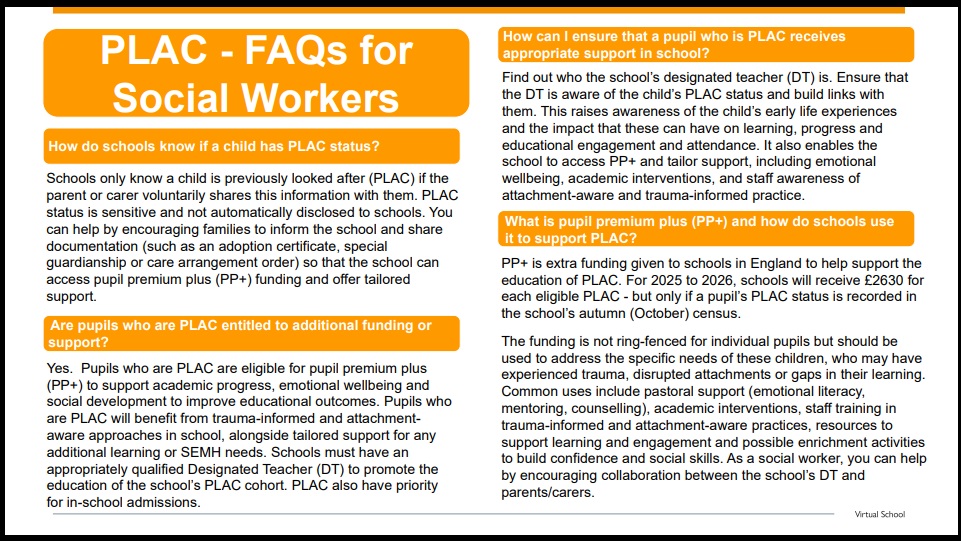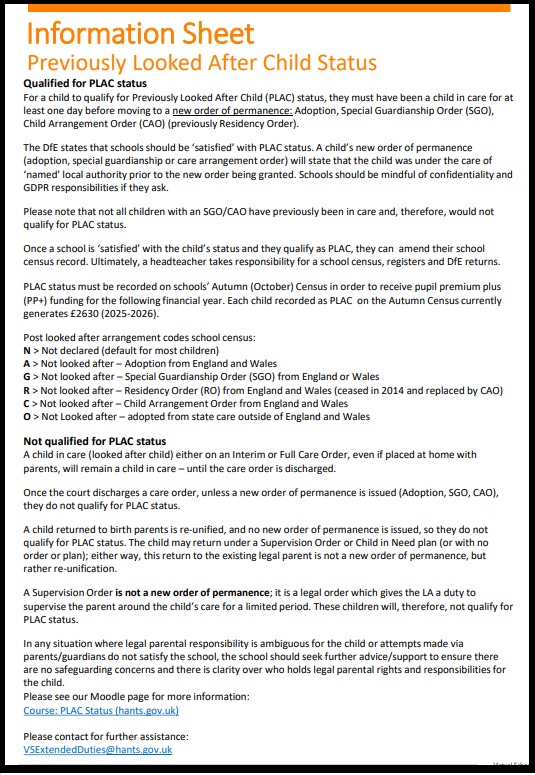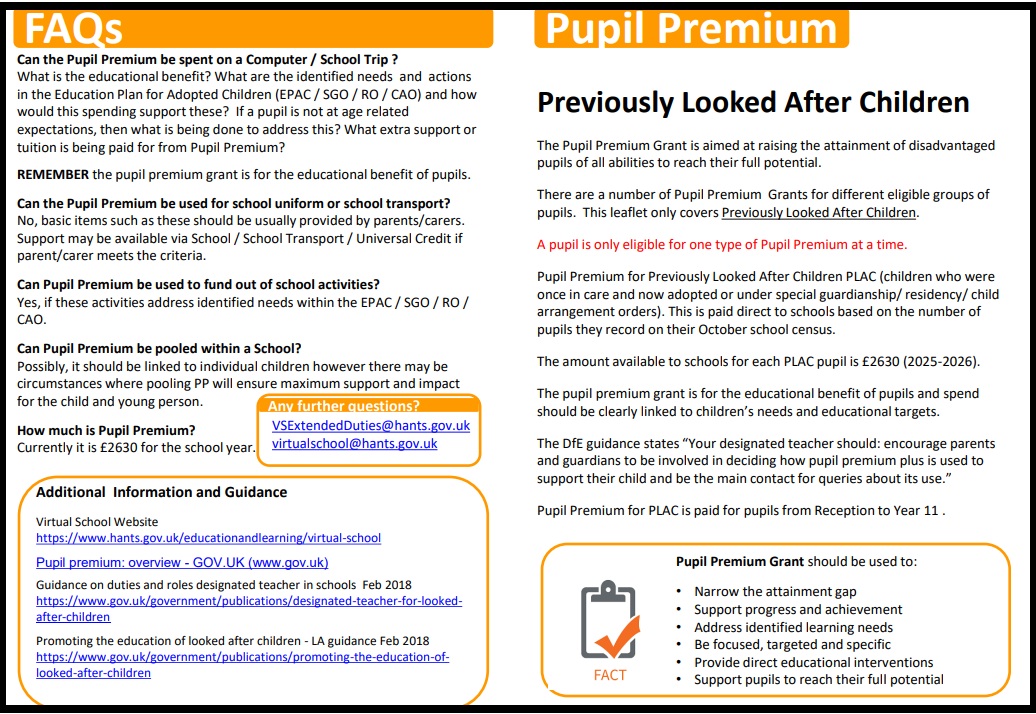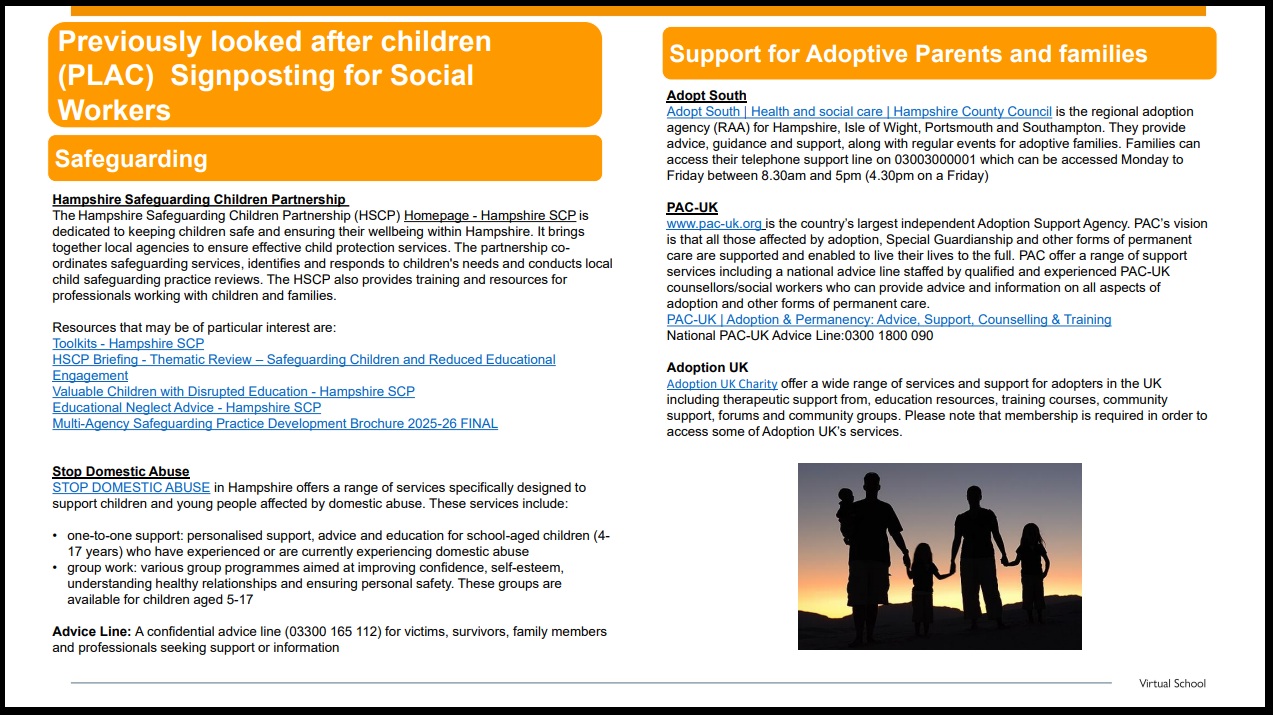Previously Looked-After Children (PLAC)
Section outline
-
This brief video outlines key information about previously looked-after children and how social workers can best support their education.
Supporting the Education of Previously Looked-After Children
Since September 2018, Virtual Schools have had a statutory duty to provide advice, guidance and information to schools, parents and a range of professionals, working to improve the educational outcomes of previously looked after children. The Virtual School promotes a culture of high aspirations, progress and achievements for all our vulnerable children and young people. However, the Virtual School is not the corporate parent for PLAC, so does not case hold these children.
Key Aims
- Make visible the needs of care experienced children and raise awareness of attachment aware and trauma informed practice
- Promote relational practice that ensures positive educational experiences and achievement for PLAC
- Enhance partnerships between parents/ carers, education settings, social workers, family practitioners and other professionals as appropriate
PLAC Status
For a child to be classified as PLAC, they must have been under the care of a Local Authority for 1 day or more before moving to a new order of permanence.
- A child’s new order of permanence (adoption, special guardianship order,* or child arrangement order*) will state within the first few pages that, prior to the order being granted, the child was in the care of a named Local Authority. This indicates that they were a child in care/ looked after prior to the new order of permanence.
- *Not all children with a special guardianship or child arrangement order will have been ‘looked after’ by a local authority and may not be classified as PLAC. If the order of permanence does not clearly state that the child has previously been in care, schools can contact the relevant post adoption or post SGO team to request this information. Adoption UK suggest that schools can request a letter from the Local Authority where the child was looked after immediately prior to their order of permanence.
- If a child returns to their birth parents after a period of being looked after/in care, this is categorised as reunification. This is not a new order of permanence and so PLAC status will not apply.
- The DfE states that schools should be ‘satisfied’ of PLAC status in order to record this information on the autumn term school census and receive pupil premium plus funding.
Click here to access important resources, including:
-
- Recognise that PLAC are likely to face challenges similar to those of looked-after children, including trauma, attachment difficulties, and disrupted education.
- Build strong communication and collaboration with a wide range of professionals in education, health and other partner agencies to create a coordinated support plan
- Ensure relationships and child and parent/carer voice are at the centre of any approach
- Work closely with the Virtual School and designated teachers (DT) in schools to ensure PLAC receive appropriate support
- Know who the most appropriate contacts are in schools (e.g. class teacher/form tutor, DSL, DT, SENCo, etc)
- Encourage the use of Education Support Plans (ESPs) in school, even though they are not statutory for PLAC
-
- Identify and know their PLAC cohort
- Encourage parents to confirm when children are previously looked-after so that this can be recorded in the school census in order to receive pupil premium plus funding
- Designate a member of staff (the designated teacher) to have responsibility for promoting the educational achievement of previously looked-after pupils
- Ensure the designated teacher undertakes appropriate training and keeps up to date with national messages
- Identify and understand the barriers and needs for this group of children
- Ensure prioritisation of the cohort and targeted response
- Provide relevant training and support for staff
- Ensure relationships and pupil voice are at the centre of any approach
- Encourage parents and guardians’ involvement in how pupil premium plus funding is used to support their child,
- Consult the Virtual School on how to use funding effectively, where appropriate
-
- Training and development offer to schools & partners
- Enhancing links and relationships between schools/ education settings and Family Help teams
- Providing advice and guidance via the Extended Duties team-VSExtendedDuties@hants.gov.uk
- Providing appropriate signposting and building links with relevant agencies and professionals
- Targeted data informed interventions / projects
- Free tools, resources and information
The Virtual School does not work with individual children who have PLAC status - including tracking and monitoring educational progress of individual children and providing academic or other interventions. -
- The designated teacher for looked after and previously looked-after children: Statutory guidance on their roles and responsibilities
- Pupil Premium Overview
- Using pupil premium: guidance for school leaders
- Evidence Brief: Using research evidence to support your spending decisions (EEF)
- Working together to improve school attendance - GOV.UK




